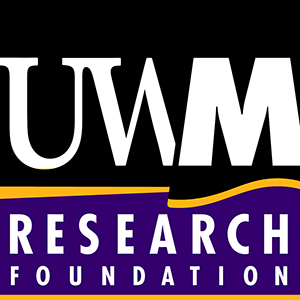UW-Milwaukee is a respected R1 research institution with world class faculty investigators and facilities that can help your company reach its goals by:
- Increasing innovation
- Gaining access to expertise
- Accessing facilities and equipment for conducting R&D
- Feeding your talent pipeline
- Saving cost and time
- Supporting your community
The UWM Research Foundation works to develop strategic partnerships with companies in the Milwaukee region and beyond by helping provide companies with a pipeline of talent, access to technology developed at UWM, and collaborative relationships with UWM researchers in basic and applied research. In partnership with the Office of Sponsored Programs, the UWM Research Foundation can develop confidentiality agreements, material transfer agreements, and sponsored research agreements that make corporate research partnerships possible.
UWM Key Areas of Expertise
Research Areas of Strength/Collaboration Centers
- Advanced Energy and Energy Systems: 3 centers and 4 service labs, including NSF funded Industry-University Cooperative Research Center (IUCRC)
- Power/Propulsion and Hypersonics: 2 centers and 3 service labs, including wind tunnel lab and NSF funded IUCRC
- Advanced and Additive Manufacturing: 3 centers/institutes and 3 service labs
- Advanced Materials: 2 centers and 5 service labs
- Biomedical: 3 centers and 7 service labs
- Human Performance: Clinical Simulation Center and 3 service labs
- Lubar Entrepreneurship Center (LEC)
- NSF i-corps
College of Engineering & Applied Science
Advanced Analysis Facility provides access to instruments to conduct research at steps in the product development cycle and failure analysis – surfaces, coatings, materials, thermal and corrosion testing. Equipment list.
Advanced Manufacturing & Design Lab helps design complex systems with advanced modeling and simulation.
Advanced & Nano Cement Lab focuses on improving the fundamental properties of cement.
Advanced Structure Lab specializes in design of new and existing sensing systems.
Big Data Analytics Visualization Lab applies computational approaches for massive data processing in biomedical, IoT, connected system, and other applications.
BioRobotics Lab focuses on the development of wearable robots to rehabilitate and assist physically disabled individuals.
Center for Composites conducts research for materials, supply, and manufacturing industries using ultralight metals, self-lubricating composites, and other materials for applications in biomedical, auto, small engine, and more. Equipment list.
Center for Sustainable Electric Energy Systems is focused on topics of electric energy with emphasis on sustainability.
Decision Systems & Artificial Intelligence Lab develops computational approaches to solve complex problems such as improving human health outcomes.
Energy Storage Research Lab focuses on developing energy products with longer and stronger storage capabilities. Full battery lifecycle development and analysis. Equipment list.
Foundry & Solidification Processing Lab specializes in technology to improve materials and processes in foundries – metal composites, polymers, self-healing materials, and more.
Grid Connected Advanced Power Electronic Systems Center focuses on energy storage, microgrids, power electronics, and renewable energy systems.
Industrial Assessment Center conducts reviews in energy efficiency, environmental stability, smart manufacturing, cybersecurity, wastewater, and water-energy relationships.
Laboratory for Flow & Transport Studies in Porous Media models flow of liquids and composites in porous media.
Power Electronics Research Laboratory and the Power Energy Lab are part of the Center for Sustainable Electric Energy Systems, which conducts projects on microgrids, distributed renewable energy generation, energy storage systems and controls.
Structural Engineering Laboratory allows structural and durability testing of components in civil, mechanical, biomedical, and other engineering applications. Services & equipment list.
Wind Tunnel Research Laboratory – one of the largest experimental wind tunnels in the USA.
School of Nursing
Clinical Simulation Center provides a modeled environment for training and research related to healthcare.
School of Education
Consulting Office for Research & Evaluation assists in research design, statistical analysis, survey development, database design, psychometric analysis, evaluation design, and more.
Northwestern Mutual Data Science Institute
Data Science Institute is a center of excellence in AI, machine learning, data science, data analytics, and computer science.
Connected Systems Institute (CSI)
Connected Systems Institute leads collaborative R&D projects related to manufacturing, Internet of Things, and factory automation.
Our Services
Commercialization Grants
SBIR/STTR applicants must be small businesses, engagement with university researchers is common through R&D subcontracting arrangements and startup formation. CLICK for more info
Grant Opportunities for Academic Liaison with Industry (GOALI) is a type of proposal that seeks to stimulate collaboration between Institutions of Higher Education (IHEs) and industry. CLICK for more info
Strategic Partnering
PANTHER PARTNERING is an upfront, optional license path with a transparent, fair, minimally negotiated agreement, in order to focus on research, innovation, and bringing new products to market. CLICK for more info
TRADITIONAL LICENSING & OPTION AGREEMENTS help achieve success by ensuring that UWM technologies are successfully commercialized & will work for partners to meet their business needs. CLICK for more info

